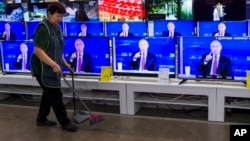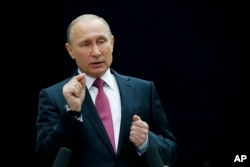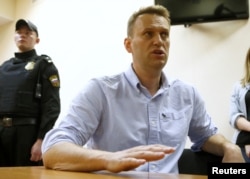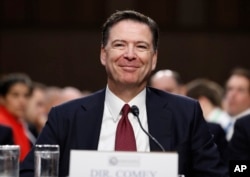Russian President Vladimir Putin's annual marathon call-in show, Direct Line, is usually a carefully crafted production designed to show how the Kremlin's top guy cares about ordinary people's concerns and quickly responds to resolve issues that local officials ignore.
The nationwide show has state television reporters in far-flung parts of the country set up with citizens to ask Putin obviously scripted questions. Other questions are chosen from callers, sent in recorded messages or come from the selected audience.
Most questions this year, like every year, were fairly bland, pandering, or focused on specific and recurring issues such as fixing Russia's economy or repairing local roads.
Critical texts
But this year's live telecast included a new feature — text messaged questions from the public, some quite critical, that popped up on screen during the program.
“Putin, do you really think that the people believe in this circus with fake questions?” read one.
“Three presidential terms is enough!" read another in reference to Putin's expected run for president again in 2018.
“All Russia thinks that you sat too long on your throne,” read another.
The sharp comments contrasting with the overall tone of the program was what struck observers most about this year's show.
“Precisely that it was like the previous ones: with the exception of the critical online questions which made it into the background, Putin's world weary demeanor, the claims that good economic conditions were just coming round the corner, all the familiar elements were there with nothing novel or unexpected,” says the Prague Institute of International Relations' Mark Galeotti. “I can only assume it was a blunder, and that someone is going to be looking for a new job.”
But not everyone watching was convinced the failure to censor the pop-up and texted questions was accidental.
“I think that he [Putin] wanted to show that not everything is staged,” said the Moscow State Institute of International Relations’ Victor Mizin. “But, I think that it's probably ... was staged like by 70 percent. It was evident. And of course it was in harsh contrast, for example, with the previous so-called Direct Line, say of 2015 or even earlier.”
Corruption
“When you say ‘we don't betray our own,’ does that apply to kleptocrats and corrupt officials?" asked another critical text question.
“Corruption is a crucial issue, one which unites in common anger everyone from Muscovite intellectuals to Siberian factory workers,” said Galeotti. “Putin cannot address it in a systematic way without having to declare war on his own elites, so instead he is stick[ing] with having to acknowledge but downplay it.”
When asked about June 12 anti-corruption protests organized by opposition leader Alexei Navalny and attended by thousands of people in cities across Russia, Putin said he was “prepared to talk with everyone who genuinely wants to improve people's lives and solve the country's problems.”
But, without naming Navalny, he dismissed “some” for “exploiting the problems instead of offering solutions.”
When a young man in the audience asked Putin about corruption, the president replied, “Did anyone coach you to ask this question?” The young man retorted “life coached me for this.”
Economic recovery?
But the issue that dominated the show was Russia's economy and the struggles of ordinary people.
Putin painted a brightening picture of crisis recovery from two years of recession with GDP up .7 percent in the first quarter of 2017. But he acknowledged that poverty has increased and salaries are not keeping up with inflation.
As every year, after each appeal was raised to Putin, he promised to look into and resolve the incorrect situation, sometimes calling out local leaders to ensure they would act.
Foreign affairs
When asked about the public testimony on Russian interference and leaks from former FBI chief James Comey, Putin jokingly offered Comey asylum as Russia did with former NSA contractor Edward Snowden.
On a more serious note, Putin criticized new U.S. sanctions on Russia, over its actions in Ukraine, saying they were “inappropriate” and “nothing good would come from them.” Russia's seizing Crimea and support for separatists in Eastern Ukraine's Donbas region were the actions that first triggered Western sanctions.
During Thursday's call-in show, Putin claimed Ukraine was just an excuse and that Western powers would have found another one.
A caller claiming to be in Kyiv asked Putin why he had abandoned Ukraine to fascists. The Russian president assured the caller he was supported, but also emphasized that Russia would not interfere in Ukraine's internal affairs.
Putin's call-in show touched on a number of other topics and ended after four hours, about the average length for the annual program.







